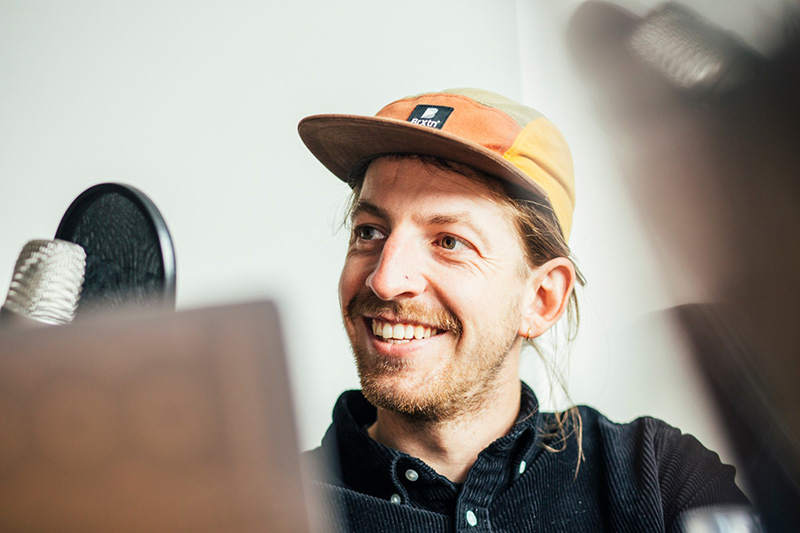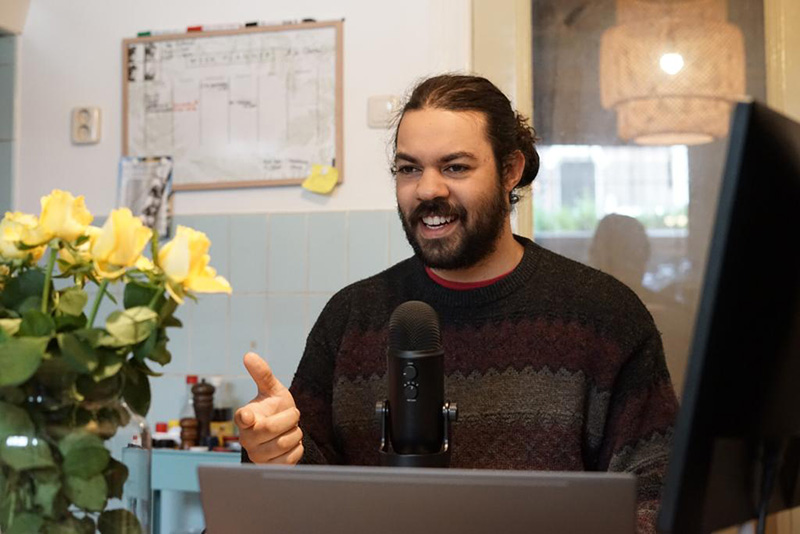Podcast: what can you become with a degree in philosophy?
Living in lockdown means that little is allowed. Lectures and meetings are mostly online. But in restriction, mastery can also awaken. This is pre-eminently the time to start something new. Univers spoke with a number of students who did just that. This time Bas Keemink and Bram Medelli; they started a podcast about philosophy.

It is all very well studying philosophy, but what can you do with it later on? Philosophy students Bas Keemink and Bram Medelli hear this often enough. From strangers, vague acquaintances, family, and even good friends. To be honest, they sometimes wondered about it themselves.
With the lockdown, they suddenly had time to look for the answer. In their podcast ik zie, ik zie, filosofie! (Dutch only) they talk to graduated philosophers about the work they started doing and how that came to be.
Bas: “I thought it would be fun to do a project like this. Everyone often has ideas like that. Nine times out of ten, you don’t do anything with them. I don’t know if it has to do with the lockdown that we started it, maybe we would have done it even if there had been no coronavirus.”
Bram: “Because of the coronavirus situation, more people are at home now. It’s easier to reach them and to interview them.”
Bas: “It does feel a bit double to visit people in a time of social distancing. But that is necessary because of the sound quality. For good recordings it is important to use good microphones.”
Bram: “In real life is still a bit more fun, conversations are more spontaneous. People are more accessible when you’re with them; it’s much easier to chat.”
Bas: “With friends I had already made podcasts. Creative projects to learn from, but I wanted to make something that was more in the area of my own expertise. A philosophical podcast. Then it’s nice to have someone acting as a sounding board. That’s how I ended up with Bram.”
Bram: “Everyone has questions: what is philosophy? Why don’t we look for answers ourselves?”
Bas: “At first we still wanted to combine the podcast with a philosophical concept, in the end we just started interviewing.”

Doing Nothing
Bram: “Last year, it was hard to start something that is not online. With our study association, we set up a diversity committee. Last month, we had an online event for this. And with friends, I started a YouTube channel in which we explain things, for example, about conspiracy thinking. It’s fun to do that, to be engaged, outside of your studies.”
Bas: “I notice that the lockdown makes me concentrate less. I have more time to read, but I actually read less.”
Bram: “I do watch a lot more series.”
Bas: “I get bored a lot more. But maybe that’s not a bad thing. Doing nothing, listening to birds, maybe that’s better for you. Nietzsche said that already.”
Ripple effect
Bram: “It’s very inspiring to talk to people, to hear how they got to where they are. By doing it, you learn a lot. In the beginning, it took some getting used to, but you notice that you get more routine as to how you should behave behind the microphone. You also become very aware of how many people can potentially listen to it.”
Bas: “We know fellow students listen to it. Occasionally, we also get comments from a fellow student about a broadcast.”
Bram: “It’s a ripple effect. Because of the podcast, our network expands, and we are approached by more people. Soon we didn’t have to look long for people to interview. We now find ourselves with an abundance of people offering to be interviewed. We are very critical of whom we pick.”
Bas: “We also get messages asking if we can interview someone with a PhD, which we have already done. Or they asked for someone who is doing a traineeship with the government. We spoke to someone like that just a few days later. That’s really fun.”
Random Wednesday
Bas: “On a random Wednesday, we threw the first episode online and ran around spamming all our connections.”
Bram: “We are more or less constantly working on that. For example, bringing it to the attention of study associations around the country.”
Bas: “Social media is a bit of an understudy, we’re not really into it. Even though Instagram is pretty important. Now we’ve found someone to help us with that, Raven Wouters for the socials, but also more structurally with the broadcasts. It’s a learning by doing project for us. She’s also going to photograph and film us for the socials.”
Bram: “Making the broadcasts takes us four to five hours a week. Last month, we recorded super much. We are already thinking in terms of seasons. We now have enough material until the summer break. Then in September, we will continue with season two. We’ll see how long we continue. I think it will be fun in fifteen years to interview our fellow students about where they ended up.”
Bas: “Or to interview the same people again in five years’ time to see how their lives have evolved.”
Future
Bas: “By the way, I still don’t know what I want to be.”
Bram: “I want to become a lot of things. Writer, journalist, opinion maker. I have lots of things I like, but I know where I want to end up. Opinion maker, journalist, I think a lot of aspiring philosophers dream about that.”
Bas: “On the basis of the podcast the interview with Esther Didden appealed to me, I would also like to become a programmer. She told me how she started; that was very instructive. The conversation with the philosophy lecturer also gave me ideas about why I would want to do that.”
Bram: “He was the oldest person we interviewed. It was very nice to speak with him. I also really like working with kids and having conversations about philosophy. That’s kind of a serious option too.”
Socratic dialogue
Bram: “I think our podcast can be very useful for people who are considering studying philosophy. We haven’t talked to anyone who is really a philosopher, but there are philosophers who have work.”
Bas: “Some have jobs that aren’t really obvious, like banker.”
Bram: “I didn’t really expect that either. Sometimes it’s not such a crazy development either. Like the traineeship with the government. The person we spoke to about it introduced the Socratic dialogue to the Amsterdam Municipality. It’s pretty cool that you can contribute that to such a position.”






